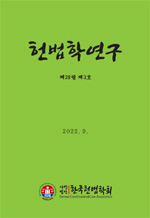최근 혐오표현으로 인한 사회적 문제가 만연함에 따라 학계・정치계・언론계・시민단체 등 다양한 분야에서 최근 몇 년간 우리 사회의 혐오표현 문제를 타개하기 위하여 표현의 자유와 더불어 혐오표현 문제를 공론화하기 시작하였고 그 해결을 위한 규제론적 담론이 활발하게 진행되고 있다. 하지만 여전히 혐오에 관한 체계적이고 구체적인 대응이 부재하고 혐오표현을 규제하기 위한 구체적인 법령의 마련 속도도 더딘 상황이다. 입법적・행정적 근거가 부재하다고 하여 우리나라 법원 또한 혐오표현에 대하여 불개입의 자세로 일관한다면 자칫 혐오표현을 무제한적으로 허용하는 듯한 인상을 줄 수 있다. 이에 법원은 입법적 근거가 마련되는 시점까지 현행법체계 안에서 혐오표현의 해악성에 경종을 울리는 판결을 축적함으로써 혐오표현에 대한 경각심을 고취하고 혐오표현이 소수자 집단 전체에 대한 차별과 배제로 이어지는 해악으로부터 소수자의 권익을 수호하는 데 이바지하여야 할 것이다. 현재 주어진 법제도하에서 혐오표현을 근저에 둔 다툼에 대응하도록 요구되는 법원은 모욕죄나 명예훼손죄로서의 형법적인 처벌, 민법상 불법행위에 대한 손해배상의 인정, 행정처분의 당부에 대한 판단 등의 방법으로, 즉 기존의 법률에 혐오표현이 적용대상이 되는 범위 내에서 다소 불완전한 방식으로 혐오표현에 대응하고 있다. 이 논문은 차별금지 및 혐오표현 규제 입법의 공백을 메우기 위하여 현행법하에서 혐오표현의 문제를 다룬 우리나라 법원의 판결을 바탕으로 현행법상 혐오표현에 대한 사법적 대응과 한계를 분석하여 더욱 실효적인 혐오표현에 대한 사법적 대응을 위하여 고려할 사항을 제언하고자 한다.
Despite the seriousness of hate speech, which is pervasive in our culture, specific administrative and legislative measures to regulate hate speech have not yet been adopted, and there is no national agreement in our nation. Fortunately, a variety of sectors, including academics, politics, the media, and civic organizations, have started to raise awareness of the problem of hate speech along with issues relating to freedom of expression, and societal efforts to address problems brought on by hate speech have been ongoing. However, there are still no organized, effective measures in place, and the process of enacting the necessary laws and regulations is moving slowly. Despite the fact that Korean society has actively participated in regulatory discourses on hate speech issues that have recently gained widespread attention. If Korean courts continue to take a non-interventionist stance toward hate speech due to a lack of legal grounds, it may appear that they tolerate it unchallenged. As a response, the Korean courts should accumulate judgments that alarm the harmfulness of hate speech within the existing legal system until a legislative basis is established. This will help to protect minority rights and interests from harm that hate speech causes to minority groups' rights and interests, such as discrimination and exclusion. Currently, instances involving hate speech are handled by Korean courts in fragmented approaches, including by criminalizing insult (or defamation) crimes, awarding damages for unlawful acts under civil law, examining the validity of administrative dispositions, etc. This study intends to offer the Korean courts judicial criteria that might be used in cases involving hate speech.
Ⅰ. 들어가며
Ⅱ. 혐오표현의 개념과 규제의 필요성
Ⅲ. 현행법상 혐오표현에 대한 사법적 대응 및 한계
Ⅳ. 혐오표현에 대한 바람직한 사법적 대응을 위한 제언: 재판과정에서 고려 가능한 판단 요소
Ⅴ. 나가며
참고문헌
(0)
(0)
